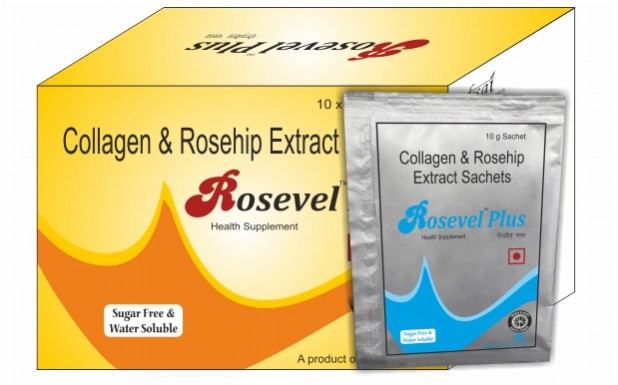Collagen helps to give strength to various structures of the body and also protects structures like the skin by preventing absorption and spreading of pathogenic substances, environmental toxins, micro - organisms and cancerous cells. In short, Collagen protein is the cement that holds everything together.
Indications and Usage:
● Maintenance of joint comfort
● Increased mobility and range of motion
● Effective in relieving symptoms associated with rheumatoid arthritis and osteoarthritis
● Improved load bearing ability of joints
● Supports natural regeneration process of the joints
Rationale of Combination:
Fresh rose hips contain a lot of vitamin C, so they share many uses with vitamin C including preventing and treating colds, flu, and vitamin C deficiencies. However, much of the vitamin C in rose hips is destroyed during drying and processing and also declines rapidly during storage. But Vitamin C is a powerful antioxidant, which aids in the production of collagen. And collagen makes up approximately 30% of the proteins within the body. These are tough and strong structures found all over the body: in bones, tendons and ligaments. But with age, collagen production slows and the cells structures weaken. The skin gets thinner and is easier to damage, hair gets lifeless, skin sags and wrinkles, tendons and ligaments become less elastic, joints get stiff etc. As collagen helps to give strength to various structures of the body, many rose hip-derived "natural" vitamin C products have actually been fortified with collagen. Collagen hydrolysates and Rosehip extract are used as Nutraceuticals for long-term treatment of osteoarthritis.
Pharmacology:
Rosehip:
Rosehip extract contains polyphenols and anthocyanins, which are believed to ease joint inflammation and prevent joint damage. It's also rich in vitamin C, which has antioxidant properties. Antioxidants are substances that can override harmful molecules (free radicals) which are produced within your cells and which may cause tissue damage or disease. It also reduces the production of specific enzymes that break down cartilage.
Collagen:
When Collagen is ingested, bioactive collagen is absorbed and passes into joint cartilage, where they help stimulate collagen synthesis; a protein which supports joints and tissues. Collagen is the major protein component of bone. The insoluble collagen matrix is osteoconductive, and provides a resorbable scaffold for anchorage-dependent cell proliferation and differentiation.
Side Effects:
Roship Extract & Collagen Hydrolysate can cause allergic reactions, constipation, diarrhoea & heartburn.
Warnings:
Pregnancy and Breast-Feeding: Not enough is known about the use of Collagen Hydrolysate and Rosehip extract in medicinal amounts during pregnancy and breast-feeding. Stay on the safe side and avoid use or consult doctor before using this.
Patient Information:
Before you take Rosehip Extract & Collagensachet do not take if you are in this conditions:
Bleeding Conditions: Collagen Hydrolysate &rose hip, might slow blood clotting. Taking rose & Collagen Hydrolysate hip might increase the risk of bleeding in people with bleeding disorders.
Diabetes: The vitamin C in rose hip & Collagen Hydrolysate might affect the control of diabetes, but not all experts agree on this.
Glucose-6-phosphate dehydrogenase deficiency (G6PD deficiency): Large amounts of the vitamin C in rose hip & Collagen Hydrolysate might increase the risk of complications.
Kidney Stones: Large amounts of the vitamin C in rose hop might increase the risk for kidney stones.
Iron-related disorders such as hemochromatosis, thalassemia, or anemia: Use rose hip & Collagen Hydrolysate with caution if you have any of these conditions. The vitamin C in rose hip can increase iron absorption, which could make your condition worse.
Sickle Cell Disease: It is rare, but the vitamin C in rose hip might & Collagen Hydrolysate make blood more acidic, and this could bring on a sickle cell crisis. It's best to avoid use.
